RESURRECTION OF PARTY.
Mn. GLIDSTONE looks back to the days when Party divided the House of Commons—when Sir Robert Peel was on one side and Lord John on the other ; and he looks forward to the day when party combinations shall be restored. Many will agree with him. While party spirit was dominant, it sacrificed everything to itself, and we could trace to it the denial of many public be- nefits. Its breaking-up was the good effect of a good. cause. We have had coalitions—the combination of individuals sacrificing party trust for personal promotion ; but the Whig and Tory sec- tions were not thus assassinated by the chosen leaders. They lost their distinctive antagonism, because they came to a con- scientious agreement on the most important questions that moved the country. By his exhortation to "register," Peel accepted the enlarged constituency, and identified Conservatism with a step in that extension of the franchise the necessity of which he saw in his early days. Afterwards he agreed with the Liberals on the merits of free trade, and went before the official Whigs in perceiving its practicability; and
from that date there was nothing, except superior business capa- city, to distinguish the Conservative leader from the Whig leafier. The agreement destroyed the faculty of party to obstruct good. measures. A fraction of the Tory party remained "true to its colours," distinctively identified itself with obsolete bad measures, and rendered the very ghost of faction ridiculous. There was a chance that this residuary abortion of a party would obtain pos- session of power in 1852; all the notables united to strangle the superannuated embryo ; and it died hysterically amid the financial romances of its chief and the electioneering witticisms of W. B. and A. S. We sang the song of triumph, that party was "very dead indeed."
And now Gladstone revives the hopes of restoring party— Gladstone, who has done as much as any man to kill party, by neutralizing differences yet regenerating doubts! And there is "much to be said on that side of the question." While party domineered, we felt the abuses of party. Since it has been dea , we discover that the dear departed had some virtues ; and in its absence we perceive the want of those impulses which origin- ally banded men together. The theories, indeed, which form the life breathed into party at its birth, are intelligible and present only to the few. Men obtain adhesion to those principles by illustrating them in practice : they are loyal, chivalrous, generous with Tories ; or outspoken, patriotic, freedom-loving with Liberals. To keep their influence, they must preserve high spirit, and do good work. Party abolished, political emulation dies ; there is nothing for any number of men to " rally " round ; the many become listless, indifferent, heedless ; the political initiative, and the political determination, are left to the Executive ; and the apathy of the public places representative machinery out of gear, leaving us to a bureaucracy. Higher principles go to sleep; expediency rules the day ; and men of no distinctive political principles—cosmopolitans--dispose of affairs by the philosophy of diplomacy, without municipal energy or nationality of feeling.
Party principles delayed religious equality, Parliamentary re- form, free trade ; the want of party organization debars us from the full fruition of those great measures, from adding to them administrative reform, and from securing beyond our own con- fines the outposts of Liberal policy where our own interests if not our security are at stake.


































 Previous page
Previous page